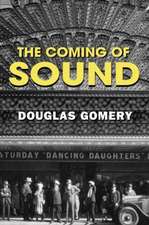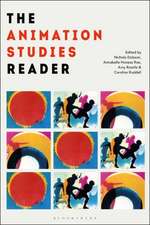American Eccentric Cinema
Autor Dr. Kim Wilkinsen Limba Engleză Hardback – 20 feb 2019
| Toate formatele și edițiile | Preț | Express |
|---|---|---|
| Paperback (1) | 223.38 lei 43-57 zile | |
| Bloomsbury Publishing – 19 aug 2020 | 223.38 lei 43-57 zile | |
| Hardback (1) | 714.92 lei 43-57 zile | |
| Bloomsbury Publishing – 20 feb 2019 | 714.92 lei 43-57 zile |
Preț: 714.92 lei
Preț vechi: 1027.89 lei
-30% Nou
Puncte Express: 1072
Preț estimativ în valută:
136.80€ • 143.19$ • 113.86£
136.80€ • 143.19$ • 113.86£
Carte tipărită la comandă
Livrare economică 31 martie-14 aprilie
Preluare comenzi: 021 569.72.76
Specificații
ISBN-13: 9781501336911
ISBN-10: 1501336916
Pagini: 224
Ilustrații: 21 bw illus
Dimensiuni: 152 x 229 mm
Greutate: 0.5 kg
Editura: Bloomsbury Publishing
Colecția Bloomsbury Academic
Locul publicării:New York, United States
ISBN-10: 1501336916
Pagini: 224
Ilustrații: 21 bw illus
Dimensiuni: 152 x 229 mm
Greutate: 0.5 kg
Editura: Bloomsbury Publishing
Colecția Bloomsbury Academic
Locul publicării:New York, United States
Caracteristici
Establishes cinematic American Eccentricity as the arm of a broader cultural position that can be perceived in television and music
Notă biografică
Kim Wilkins is a Postdoctoral Fellow in Screen Cultures at the University of Oslo, Norway. Her current research examines national and cultural identity in post-reunification Berlin screen cultures. She has published widely on American indie cinema, particularly the films of Wes Anderson and Spike Jonze.
Cuprins
AcknowledgementsIntroductionNeoliberal Citizenship and the Eccentric Locating the Eccentric in CinemaNew Hollywood and Eccentric ConnectionsChapter One: Defining American EccentricityIndie and EccentricityAmerican Eccentricity and IronyAnxietyEccentricity Chapter Two: Road Films and National IdentityAmerican Eccentricity and GenreThe Eccentric Road Film: From Easy Rider to The Darjeeling LimitedThe Road and Kaufman's Mind TripsChapter Three: Overtly Cinematic CharacterizationOvertly Cinematic Characters and Audience Identification Wes Anderson and Overtly Cinematic CharacterizationEccentric or 'Smart' Characterization?Wes Anderson's Eccentric CharactersChapter Four: Hyper-Dialogue and the Eccentric MannerThe Shift from New Hollywood Naturalism to Eccentric Hyper-Dialogue Dialogue and ConventionHyper-Dialogue and PerformanceHyper-Dialogue as Dramatic FunctionHyper-Dialogue and SincerityChapter Five: Eccentric WorldsEccentric Deviations from Realism Eccentricity and the Intertextual WorldEccentric Cities: MagnoliaConclusion: Beyond EccentricityRipples of EccentricityOutside the Box IndexFilmographyBibliography
Recenzii
[Wilkins] provides readers with thought-provoking and perspective-changing ideas of eccentric cinema and its motives.
American Eccentric Cinema restores politics to the core of the indie agenda, deftly tracing the contours of some of the most critically and popularly successful films of the contemporary era as symptoms of - but also challenges to - the anxieties and divisions of neoliberal society. Kim Wilkins' welcome take on this sector brings the central debates in scholarship on American independent cinema into conversation with some of the most pressing social and political developments of the moment.
I was highly impressed by every dimension of this superb work. Focused on American films of especially the last two decades, its foundation establishes its perspective as a historical counterpoint to the existential cinema of the 1960s and 1970s, and then builds a fairly intricate framework on notions of "irony with sincerity" and a mode of cultural and personal anxiety that is "essentially objectless." As a mode that inflects different contemporary genres, for Wilkins, these films mobilize four textual characteristics: 1) transgressions and subversions, 2) "hyper-dialogue," 3) pure cinematic characterizations, and 4) "eccentric" cinematic worlds. Each chapter lucidly follows these textual strategies, anchored in some quite brilliant and often original readings of individual films. Throughout, the research and writing are impeccable, wide-ranging, and stylish.
This is a remarkable book that successfully identifies and delineates a peculiar mode of contemporary American cinema. Kim Wilkins achieves this feat by cultivating a wealth of invaluable concepts - from general theories of neoliberalism, existential anxiety, irony, and sincerity, to specifically filmic notions of hyper-dialogue, overtly cinematic characters, and idiosyncratic cinematic worlds. American Eccentric Cinema is thoroughly researched, well-organized, and lucidly written.
American Eccentric Cinema restores politics to the core of the indie agenda, deftly tracing the contours of some of the most critically and popularly successful films of the contemporary era as symptoms of - but also challenges to - the anxieties and divisions of neoliberal society. Kim Wilkins' welcome take on this sector brings the central debates in scholarship on American independent cinema into conversation with some of the most pressing social and political developments of the moment.
I was highly impressed by every dimension of this superb work. Focused on American films of especially the last two decades, its foundation establishes its perspective as a historical counterpoint to the existential cinema of the 1960s and 1970s, and then builds a fairly intricate framework on notions of "irony with sincerity" and a mode of cultural and personal anxiety that is "essentially objectless." As a mode that inflects different contemporary genres, for Wilkins, these films mobilize four textual characteristics: 1) transgressions and subversions, 2) "hyper-dialogue," 3) pure cinematic characterizations, and 4) "eccentric" cinematic worlds. Each chapter lucidly follows these textual strategies, anchored in some quite brilliant and often original readings of individual films. Throughout, the research and writing are impeccable, wide-ranging, and stylish.
This is a remarkable book that successfully identifies and delineates a peculiar mode of contemporary American cinema. Kim Wilkins achieves this feat by cultivating a wealth of invaluable concepts - from general theories of neoliberalism, existential anxiety, irony, and sincerity, to specifically filmic notions of hyper-dialogue, overtly cinematic characters, and idiosyncratic cinematic worlds. American Eccentric Cinema is thoroughly researched, well-organized, and lucidly written.























